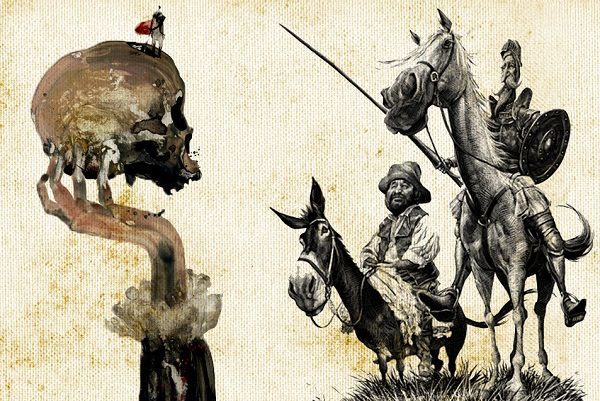Ivan Turgenev on Hamlet and Don Quixote // The madness in Hamlet and Don Quixote

Speech delivered by Ivan Sergeyevich Turgenev, (1818-1883) on January 10, I860, at a public reading for the benefit of the Society for the Aid of Indigent Writers and Scientists: The first edition of Shakespeare's tragedy Hamlet and the first part of Cervantes' novel Don Quixote appeared in the same year, at the very beginning of the seventeenth century. This concurrence seems momentous. The proximity of time in this instance induces a consideration of a whole series of events. "He who would comprehend a poet," Goethe maintained, "must enter that poet's environment." And though one who is not a poet himself has no right to demand, he can nevertheless hope that his audience will accompany him on his wanderings - will share his tour of exploration.
Some of my views may perchance be puzzling in their uniqueness. But the
poetic masterpieces created by the genius of superior minds, and endowed with
an eternal vitality, have this peculiarity as well: that one's conceptions of
them, as of life in general, may differ greatly from one another's, may even be
diametrically opposed, yet at the same time be valid. Much comment on Hamlet has already come forth, and much more is still to
come. What varied conclusions have already been reached by the numerous
scholars, who have scrutinized this character, as unfathomable as an unplumbed
well! Don Quixote, on the other hand, because of the idiosyncrasy of its
purpose and the truly admirable lucidity of a narrative that seems permeated by
the Southern Sun, does not permit of such a diversity of critical reaction.
It is unfortunate, however, that our conception of Don Quixote should be
equivocal; only too often we substitute the name of Don Quixote for a jester;
the term quixotism carries the connotation of idealistic twaddle; whereas in
reality one ought to discern Quixotism as an archetype of self-sacrifice, even
though Don Quixote himself has been portrayed as a ludicrous figure. .. Download the essay here:
The madness in Hamlet and Don Quixote NB: The image at the tope of this post has been taken from this source). The immortal images of Don Quixote and Hamlet have excited thinking people from different times and peoples. They attract the interest of modern man. Literary scholars, philosophers and psychologists have written many pages to clarify their essence, compare them, and look for similar traits and differences between them. Indeed, at first glance, they seem to have nothing to do with them. Can they look like Denmark's brilliant high-educated prince and the impoverished Hidalgo thrown away by the fate of the deep Spanish province, lost its mind by reading the mediocre crazy knightly novels. In front of the physically perfect Hamlet, Don Quixote, and outwardly looks like a pathetic cartoon. However, this is only at first glance. By living philosophy, moral beliefs and deeds, they resemble one-sided twin brothers, a child of the same historical age - the late European Renaissance, very often characterized as a "Renaissance crisis."
The essence of this relic is rooted in the
fact that Hamlet, and Don Quixote are the same aesthetics, of the same approach
to art as opposed to the poetry of the ideal and the prose of reality. An
elegant way of presenting this contradiction is the depiction of madness. Thus,
anyone who carries in his heart the ideals of honor, freedom, beauty, justice
and love seems crazy in the eyes of pragmatically oriented people. The
Renaissance marks the end of the Middle Ages with its ignorance, asceticism,
scholasticism and cruel domination of the church, and proclaims the beginning
of new times - of libertarianism, of faith in the forces of man, the flowering
of science, art, culture. The man of this age gets a new self-esteem. He no
longer hopes only on God, but relies above all on himself.
Don Quixote and Hamlet are the bearers of
the sublime Renaissance ideals. The living conditions of life, however, do not
allow them to realize them in life. They are exceptional personalities, but
they can not overcome their more objective circumstances. This makes them truly
tragic heroes, misunderstood and declared abnormal. Don Quixote and Hamlet
declare war on evil in the world. Hamlet can not cope with injustice because he
is active and honest, but he can win - no strength. The loneliness of the hero
ultimately strengthens the hero's tragedy….
https://steemit.com/story/@daydreaming/the-madness-in-hamlet-and-don-quixote